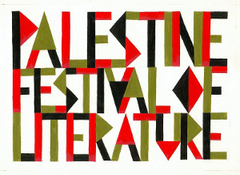Over 1,000 literary figures boycott Israeli publishers ‘complicit in Palestinian oppression’

Palestine Festival of Literature
Rachel Fink reports in Haaretz on 29 October 2024:
More than 1,000 figures from the literary industry, including noted authors Sally Rooney, Arundhati Roy and Rachel Kushner have signed a pledge to boycott Israeli cultural institutions that “are complicit or have remained silent observers of the overwhelming oppression of Palestinians.”
The campaign was co-organized by Palestine Festival of Literature (also known as PalFest) which posted it to their website on Monday.
“We, as writers, publishers, literary festival workers, and other book workers, publish this letter as we face the most profound moral, political and cultural crisis of the 21st century” the letter begins. “The overwhelming injustice faced by the Palestinians cannot be denied. The current war has entered our homes and pierced our hearts.
Invoking South African apartheid, the petition said, “We cannot in good conscience engage with Israeli institutions without interrogating their relationship to apartheid and displacement.”
According to a Palfest press release, the signatories are only willing to work with Israeli publishers, book festivals, literary agencies and publications who “denounce and distance themselves from Israel’s genocidal apartheid regime” and “affirm the full protected rights of the Palestinian people under international law, including the right of return.”
Palfest, in collaboration with the other co-sponsoring groups, say they have researched 98 Israeli publishers and found only one who met these two criteria – an independent publisher called November Books.
On its website, November Books describes itself as an “ideological publishing house” that aims to promote alternative voices that do not have a sufficient presence in the Israeli public sphere. “We strive to promote the full implementation of human rights, in accordance with the principles of international law and all UN resolutions, for all human beings wherever they are, in particular for all Palestinians, and especially for those living under occupation,” the description reads.
Among the letter’s signatories are a host of award-winning writers, including Irish author Sally Rooney, a longtime critic of Israel, who in 2021 decided she would not be publishing her new book “Beautiful World, Where Are You?” in Hebrew. The Israeli publishing house that distributed her first two books, Modan, was specifically named in Monday’s boycott letter.
At the time, Rooney wrote of her decision, “I understand that not everyone will agree with my choice, but I simply do not feel it would be right for me under the present circumstances to accept a new contract with an Israeli company that does not publicly distance itself from apartheid and support the UN-stipulated rights of the Palestinian people.”
In response to the letter campaign, author of “We Need to Talk About Kevin” Lionel Shriver penned an opinion piece for The Free Press in which she accused organizers of trying to intimidate authors into joining the boycott. “Writers used to enjoy conflict, complexity, contradiction – duking it out on paper or raucously talking over each other on a festival panel,” she wrote. “Now we chant in a unified chorus.”
Booker Prize-winning author Howard Jacobson and Lee Child, the writer of the Jack Reacher novels, also echoed Shriver’s criticism. Speaking to U.K. news outlet The Times, Child said that his fellow writers should not “attack their Israeli counterparts whose hearts are still in the right place.”
According to a report in the Guardian on Monday, U.K. Lawyers for Israel (UKLFI), an association of lawyers supporting Israel, also sent its own letter to the Society of Authors, the Publishers Association and the Independent Publishers Guild in counterprotest. “This boycott is plainly discriminatory against Israelis,” the letter read. “The authors do not impose similar conditions on publishers, festivals, literary agencies or publications of any other nationality.” UKLFI also alleged legal risks involved in participating in the boycott.
In response to the response, co-founder and current festival director of PalFest, Omar Robert Hamilton, told the Guardian he believes the UKLFI’s letter “is only notable for its moral bankruptcy and proves that Israel’s apologists have nothing to say.”
This article is reproduced in its entirety
